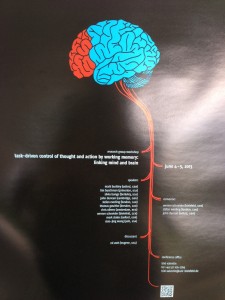THURSDAY, APRIL 18TH
Executive Function: Basic Science to Intervention: Room 4C-3 (Washington Convention Center)
Discussant(s): Adele Diamond (University of British Columbia)
Chair(s): Philip Zelazo (University of Minnesota)
10:20 AM – 11:50 AM: A Neuroscientific Perspective on the Cognitive Training of Executive Function
Silvia A. Bunge
Poster Session 5: Exhibit Hall 4EF (Washington Convention Center)
2:40 PM – 3:40 PM: Variations on the Bilingual Advantage? Heritage Language Maintenance and Executive Function in 2nd Generation Immigrant Children
Stephen H. Chen; Qing Zhou; Silvia A. Bunge
_____________________________________________________
FRIDAY, APRIL 19TH
Mindfulness In children: The effects of training studies in low- and high-risk samples: Aspen (Sheraton Seattle Hotel, 2nd Floor)
Discussant(s): Silvia Bunge (University of California, Berkeley)
Chair(s): Elisa Esposito (University of Minnesota)
12:30 PM – 2:00 PM: Mindfulness in children: The effects of training studies in low- and high-risk samples
Elisa A. Esposito; Silvia A. Bunge
12:30 PM – 2:00 PM: Benefits of Mindfulness Training in Early Childhood
Anna E. Johnson; Kristen Lyons; Philip D. Zelazo
12:30 PM – 2:00 PM: Applications of a Mindfulness-based Curriculum in Early Education
Lisa Flook; Richard J. Davidson
12:30 PM – 2:00 PM: The Effects of Mindfulness and Executive Function Skills Trainings on Post-Institutionalized Children
Jamie M. Lawler; Elisa A. Esposito; Colleen B. Doyle; Anna E. Johnson; Megan Gunnar
_____________________________________________________
SATURDAY, APRIL 20TH
Poster Session 13: Exhibit Hall 4EF (Washington Convention Center)
10:20AM – 11 :20AM: Developmental Differences in Medial Temporal Lobe Recruitment During Episodic Recollection
Marcos Sastre; Julia Ross; Jacqueline Pospisil; Joshua K. Lee; Carter Wendelken; Silvia A. Bunge; Simona Ghetti
Memory: Context and Predictors: Aspen (Sheraton Seattle Hotel, 2nd Floor)
Chair(s): Catherine Haden (Loyola University Chicago)
10:20 AM – 11 :50 AM: Increasing White Matter Coherence Between MTL and PFC Supports Improving Mnemonic Control in Children
Carter Wendelken; Joshua K. Lee; Jacqueline Pospisil; Marcos Sastre; Julia Ross; Silvia A. Bunge; Simona Ghetti
Poster Session 14: Exhibit Hall 4EF (Washington Convention Center)
11 :40AM – 12:40 PM: I Spy a Triangle! Preschoolers’ Geometric Knowledge
Angeliki Athanasopoulou; Brian N. Verdine; Ann Bunger; Roberta Golinkoff; Kathryn A. Hirsh-Pasek

